A new e-commerce venture is exciting. You can pick your company’s name, design the logo and branding, and develop the website. It’s simple to focus on your immediate requirements, but it’s as crucial to consider your company’s future goals and the additional tools you’ll want.
Choosing the greatest online shop builder is no longer sufficient in the modern world. Savvy businesspeople search for the finest e-commerce platform, an ecosystem of technologies that seamlessly connect and provide you total control over every element of your company’s operations and the flexibility to scale as it expands.
It’s simple to lose sight of the primary considerations while deeply engaging in internet comparison shopping. How important is it for you to choose the finest e-commerce platform? There isn’t a great option for everyone in the end. Instead, seek the ideal e-commerce platform that enables you to provide your clients with the most online buying convenience.
The best ecommerce platform ultimately depends on your own business model, marketing tools, and growth strategy. To assist you in choosing the best option for your company, the following is a summary of some of the top e-commerce platforms for 2023:
Shopify

Shopify is a popular e-commerce platform allowing businesses to create and manage online stores. It provides various tools and features for building an online store, such as customizable themes, payment gateways, shipping integrations, and inventory management. Shopify also offers a range of tools to help businesses with their marketing and sales, such as email marketing campaigns, social media integration, and analytics. With Shopify, businesses can easily create an online store without the need for extensive technical knowledge or coding skills.
Pricing: $1 for the first month, then $32 and above for the subsequent months.
Samcart
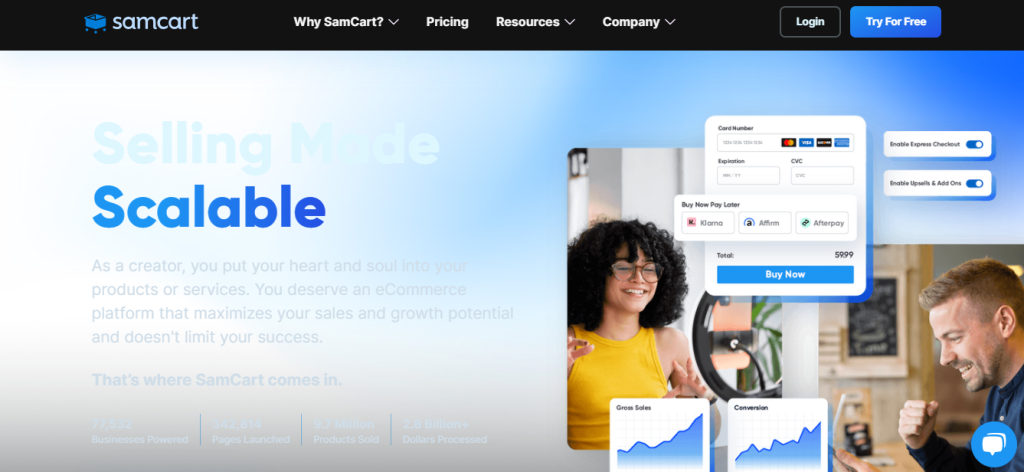
Samcart is an e-commerce platform that provides tools for creating and managing online sales funnels. It offers a range of features, such as customizable checkout pages, one-click upsells, and order bumps, to help businesses increase their sales and revenue. Samcart also integrates with various payment gateways and email marketing platforms, allowing businesses to manage their sales process from start to finish. With Samcart, businesses can create highly optimized sales funnels that are designed to convert visitors into customers.
Pricing: Starting from $52 per month
SendOwl
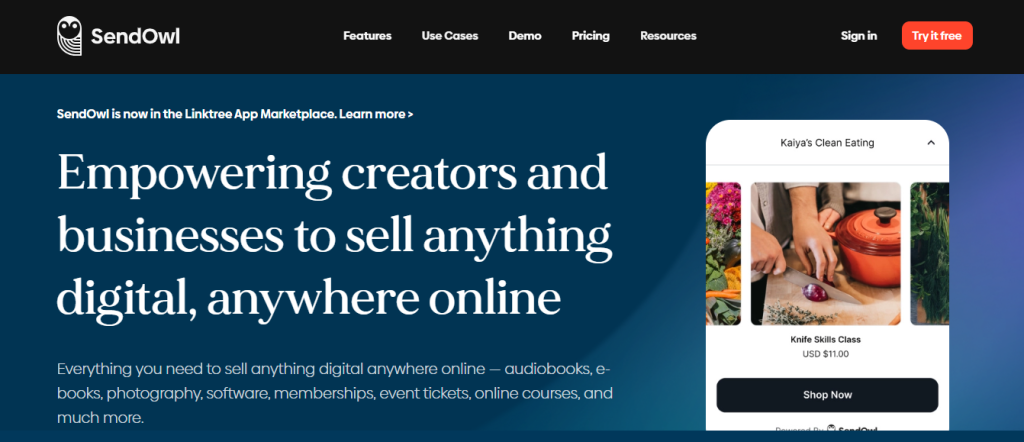
SendOwl is an e-commerce platform specializing in digital products like ebooks, software, and courses. It provides tools for creating and selling digital products, such as customizable checkout pages, download pages, and product delivery. SendOwl also offers features for managing subscriptions and recurring payments, making it an ideal platform for businesses that offer subscription-based services. With SendOwl, businesses can easily create and sell digital products without the need for complex technical knowledge or coding skills.
Pricing: Free for three months, then $9/per month.
Sellfy
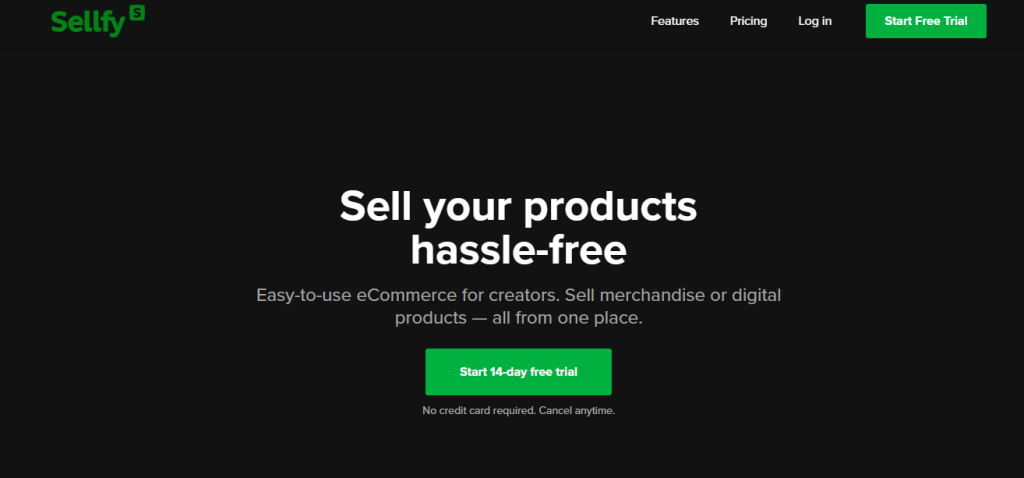
Sellfy is a digital commerce platform that allows creators, artists, and entrepreneurs to directly sell their digital products, such as ebooks, music, videos, and other digital content, to their customers. With Sellfy, users can create a customizable storefront to showcase their products. The platform provides secure payment processing, automated product delivery, and marketing tools to help users promote their products and reach more customers.
Sellfy offers a range of payment options, including credit and debit card payments, PayPal, and Apple Pay. It also supports recurring payments, which makes it easy for users to offer subscription-based products and services. Sellfy’s monthly pricing starts at $29, with additional features and functionality available on higher-tier plans.
Pricing: Starting from $19/month
Paddle
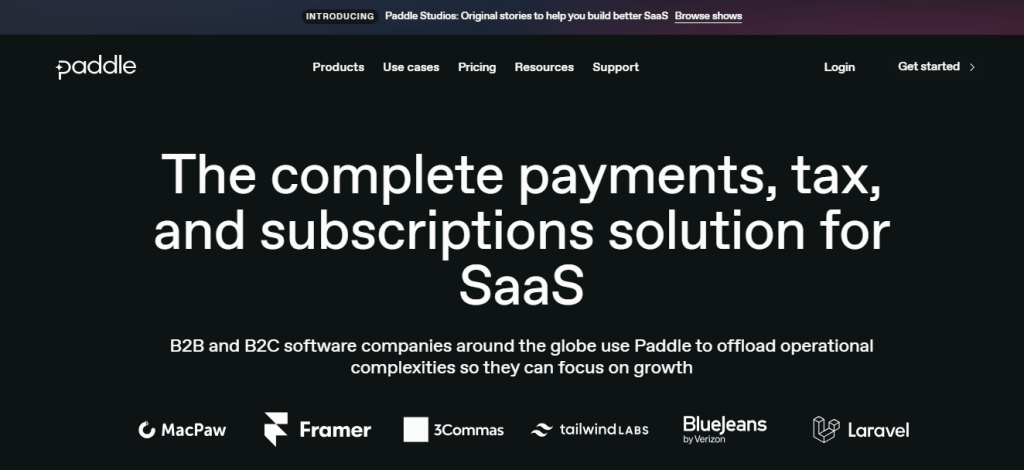
Paddle is a payment platform designed for software and digital product companies. It provides a full-stack commerce solution that includes payment processing, subscription management, fraud prevention, and customer support tools. Paddle aims to simplify the process of selling software and digital products online and help businesses grow their revenue.
Paddle supports various payment methods, including credit and debit card payments, PayPal, and local payment methods in over 200 countries. It also offers features such as flexible pricing options, subscription management, and tax and compliance support.
Pricing: Paddle charges a fee of 5% + $0.50 per transaction, with additional fees for some of its advanced features.
Payhip
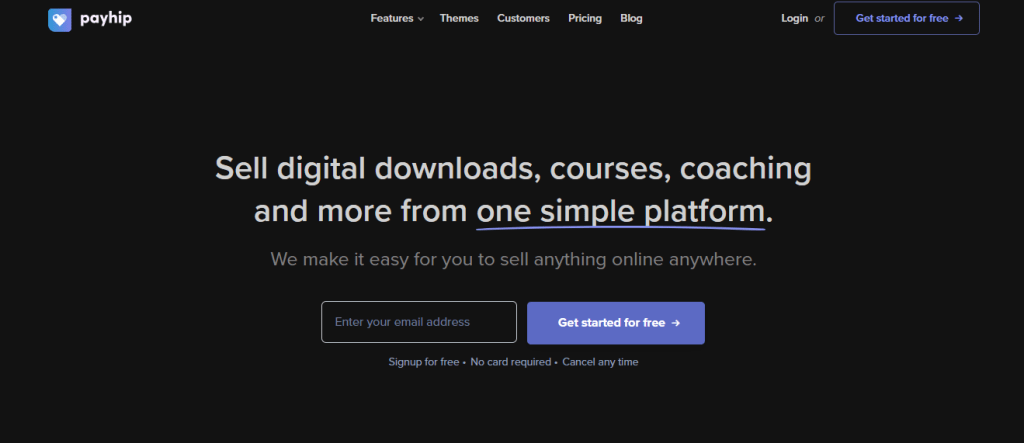
Payhip is an e-commerce platform that allows users to sell digital products such as ebooks, music, software, and courses. With Payhip, users can create a customizable storefront, set their own prices, and use the platform’s marketing tools to promote their products and reach a wider audience.
Payhip supports a variety of payment methods, including credit and debit card payments, PayPal, and Apple Pay. It also offers features such as automatic product delivery, integration with email marketing tools, and the ability to offer discounts and coupons.
Pricing: Payhip’s monthly pricing starts at $29, with additional features available on higher-tier plans.
Gumroad

Gumroad is a popular platform that allows creators to sell their digital products, such as e-books, courses, music, and software, directly to their audience. The platform offers a simple and user-friendly interface that makes it easy for creators to upload and manage their products. Gumroad also provides a secure payment gateway that accepts all major credit cards and supports multiple currencies. One of the unique features of Gumroad is its “pay-what-you-want” pricing option, which allows customers to choose how much they want to pay for a product. This feature is particularly useful for creators who want to offer flexible pricing options to their customers.
Pricing: Starting from $1
ConvertKit
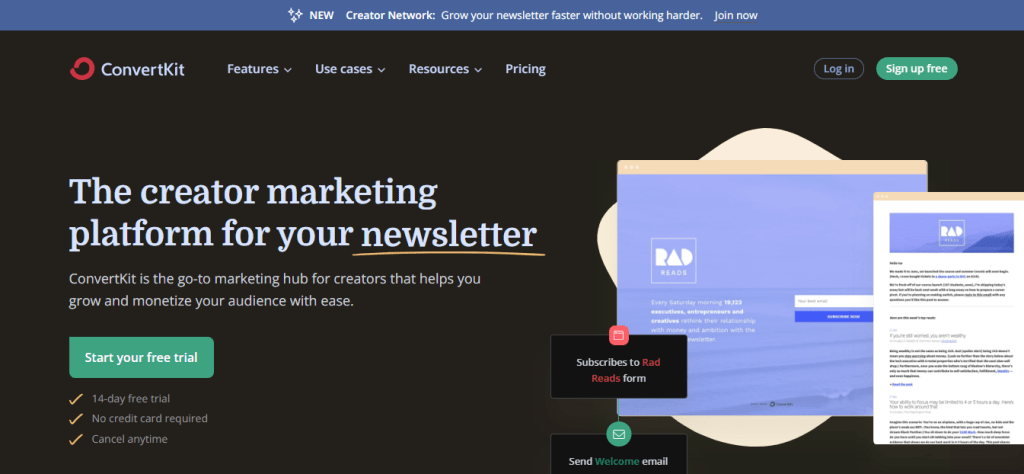
ConvertKit is an email marketing platform that allows creators to build and manage their email lists. The platform offers a range of features, such as customizable opt-in forms, automated email sequences, and subscriber segmentation. ConvertKit’s user interface is simple and intuitive, making it easy for creators to create and send emails to their audience. The platform also provides detailed analytics that helps creators track the performance of their email campaigns. ConvertKit’s pricing is based on the number of subscribers, which makes it an affordable option for small to medium-sized businesses.
Pricing: Starting from $9 per month
Lemon Squeezy

Lemon Squeezy is a graphic design tool that allows creators to create high-quality graphics for their social media, websites, and blogs. The platform offers a range of features, such as customizable templates, stock images, and a drag-and-drop editor. Lemon Squeezy’s user-friendly interface makes it easy for creators to design graphics without any design skills. The platform also provides a range of tutorials and resources that help creators improve their graphic design skills. Lemon Squeezy’s pricing is based on a subscription model, which makes it an affordable option for creators who need to create graphics regularly.
Pricing: No monthly charges; they only take a small cut of each sale.
Wix

Wix is an easy-to-use drag-and-drop website builder providing web hosting and domain name registration. You can create a basic website for free, but to utilize Wix’s ecommerce capabilities, you must switch to a premium plan.
Wix includes a few features that can aid with ecommerce functionality. Merchants may use the platform to track orders, take online payments, offer items across different channels, and develop abandoned cart campaigns.
However, it lacks some aspects critical for product-based enterprises in particular. The absence of low-stock warnings and other essential inventory management tools is one of the shortcomings.
You’ll need a platform with more extensive inventory-tracking capabilities if you have more than ten goods. Furthermore, social commerce integrations need the usage of a third-party app.
Price: Starting from $23/month.
BigCommerce
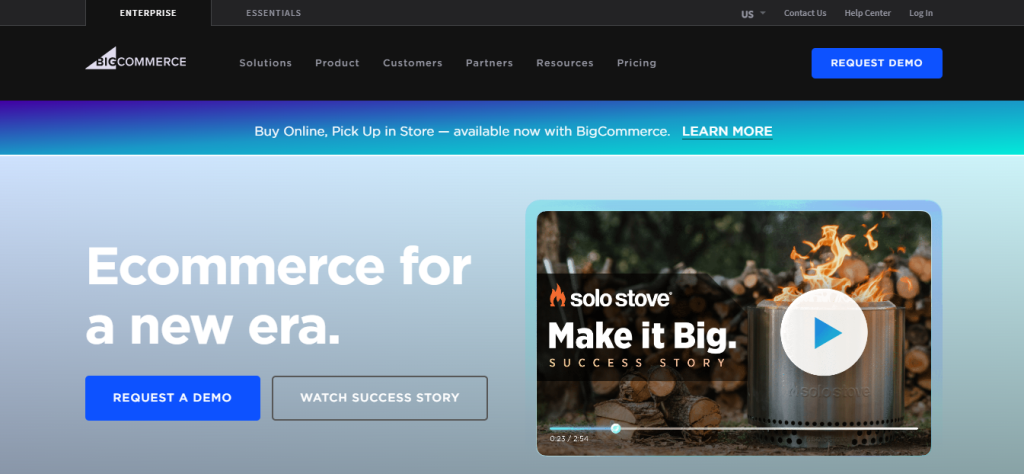
BigCommerce is an ecommerce platform that large software firms utilize. BigCommerce, like Shopify and Wix, provides online hosting and customization choices. However, you cannot acquire a domain name via BigCommerce, so you must purchase and register it elsewhere before porting it over.
International selling, SEO tools, and multichannel selling on social and third-party marketplaces are useful. These tremendous qualities, however, bring with them complexity.
A lack of flexibility and ease of use prompted Grace and Lace to quit the platform. It moved to Shopify Plus, the company’s corporate service, to have access to more than simply the ecommerce platform.
Price: Starting from $29.95/month.
Adobe Commerce (formerly Magento)
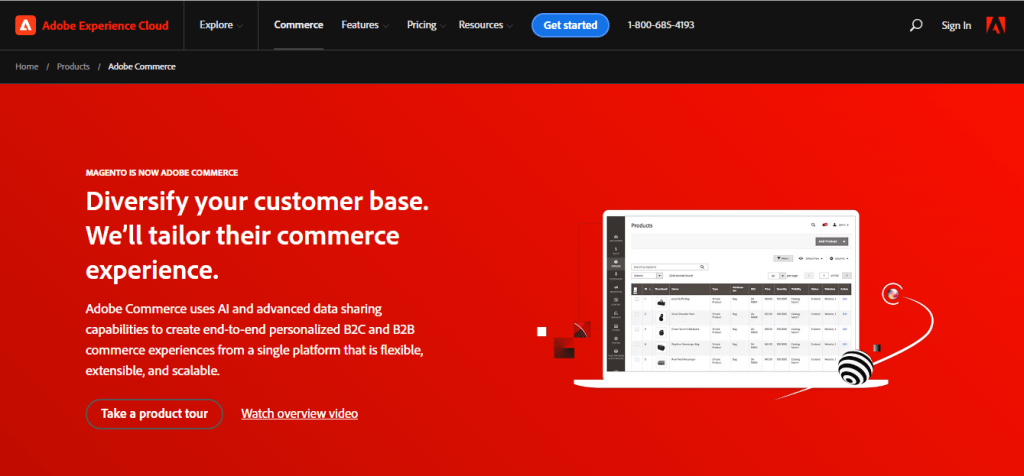
Adobe Commerce is a self-hosted ecommerce platform designed for developers looking for a system that can be customized. While this has advantages for organizations seeking a wholly customized platform, it also has a number of drawbacks in terms of complexity and expense. To construct and maintain the complete infrastructure yourself, you must have extensive coding and programming expertise.
Magento also lacks capabilities for developing a unified multichannel approach. There is no simple method to enable social commerce or marketplace selling in Magento, and the same goes for foreign currencies. If you intend to go worldwide, Magento may not be the right ecommerce platform for you.
Despite its awful UX, ecommerce site Character.com maintained its complicated Magento site with thousands of goods, dozens of connectors, and excellent SEO.
Because Magento was too restrictive and complicated, Character.com switched to Shopify. Conversions grew by 40%, and the company’s success prompted it to subscribe to Shopify Plus in order to take advantage of even more capabilities.
Price: Custom pricing only.
WooCommerce

WooCommerce is especially recognizable to WordPress users since it is effectively an add-on to the popular blogging platform. WordPress has typically been used for content-driven websites rather than ecommerce, thus WooCommerce is WordPress’s solution for individuals who wish to sell online.
Because WordPress is first and foremost a content management system (CMS) and then an ecommerce platform, many of the selling features are simple or rely on the addition of applications. And, while several applications and plug-ins are available for your business, the more you use, the more probable it is that you will damage anything. And, given the limited support choices, this isn’t always a risk worth taking.
Overall, WooCommerce’s fragility and instability make it tough to construct and run an online business. Furthermore, because it is not hosted, you will have the additional job and cost of managing your website hosting. It also lacks PCI compliance, putting your company at danger while accepting payments.
Price: WooCommerce estimates annual costs of $120/year for hosting, $15/year for domain name registration, up to $100/year for your site theme, up to $108/year for shipping, 2.9% plus $0.30 per sale, up to $348/year for marketing and communications, up to $79/year for SEO, and up to $65/year for SSL certificate.
PrestaShop
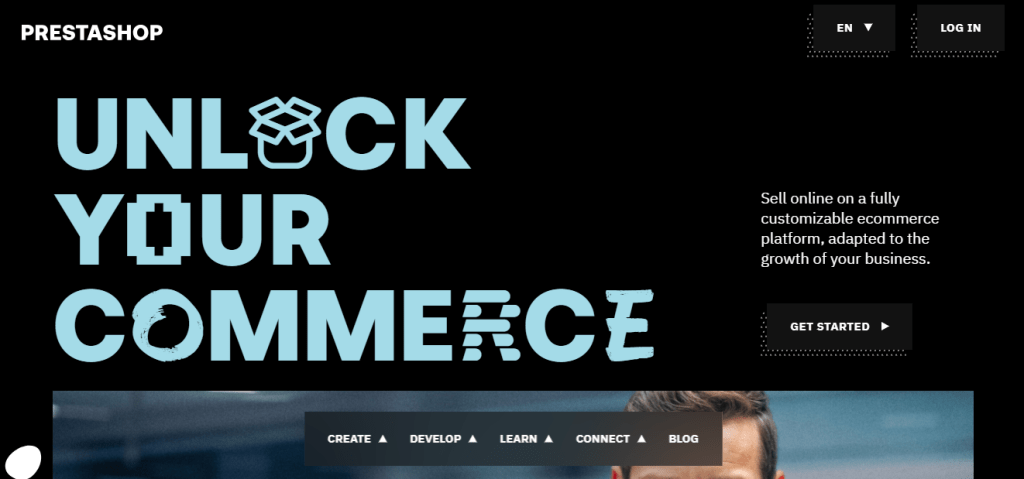
PrestaShop is a low-cost open-source ecommerce platform that is ideal for new enterprises with a technological background. PrestaShop customers perform a lot of troubleshooting themselves with the aid of the community because there is no built-in customer service and integrations can be hit or miss. Inventory monitoring, an online shopping cart, worldwide selling, and analytics reporting are examples of business tools and features. On your PrestaShop site, you also have a lot of control over the privacy and security settings. Overall, third-party hosting, the abundance of untested add-ons and modules, and the complex configuration might make managing your PrestaShop e-commerce site difficult.
Price: Free.
Squarespace

Squarespace is the following website builder with an e-commerce platform choice. Similar to Wix, Squarespace makes use of drag-and-drop technology, which is simple to operate. Both systems need to be significantly modified in order to include ecommerce functionality because they are typically used to develop websites rather than as online selling platforms.
If you want to sell products online, Squarespace has to be set up, and there are just two payment integrations—Stripe and PayPal.
You could even outsource it if you have the money. After you’ve configured the e-commerce feature, Squarespace includes functional inventory management capabilities. Higher-tiered subscriptions also allow you to offer subscription-based goods or gift cards.
You may easily add the Shopify Buy Button to your website if you don’t want to deal with the complexity of setting up an online store on the back end in Squarespace. You can add a little embeddable code to your Squarespace website for for $5/month, and Shopify’s sophisticated ecommerce capabilities will take care of the rest.
Price: Starting from $16/month

